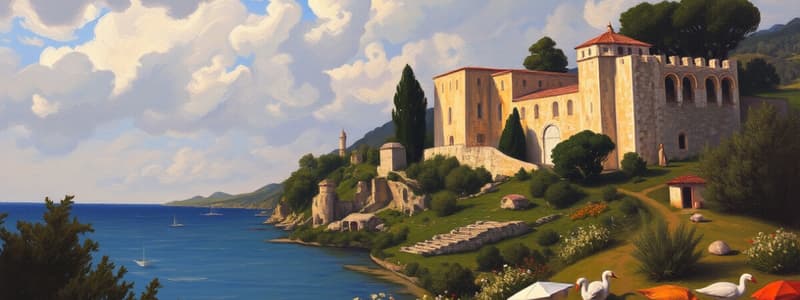Podcast
Questions and Answers
What is the time period for Greece?
What is the time period for Greece?
- 27 BCE-476 CE
- 303 BCE-1 CE
- 800-430 BCE (correct)
- 509-27 BCE
What time period did the Hellenistic era occur?
What time period did the Hellenistic era occur?
- 303 BCE-1 CE (correct)
- 27 BCE-476 CE
- 509-27 BCE
- 800-430 BCE
What is the time period of the Roman Republic?
What is the time period of the Roman Republic?
- 800-430 BCE
- 303 BCE-1 CE
- 509-27 BCE (correct)
- 27 BCE-476 CE
What was the time span of the Roman Empire?
What was the time span of the Roman Empire?
What geographical feature characterized ancient Greece?
What geographical feature characterized ancient Greece?
What was the geographical description of the Hellenistic period?
What was the geographical description of the Hellenistic period?
What was the geographical area of the Roman Republic?
What was the geographical area of the Roman Republic?
What regions were included in the geographical description of the Roman Empire?
What regions were included in the geographical description of the Roman Empire?
What type of democracy was present in Athens?
What type of democracy was present in Athens?
What type of government emerged after the death of Alexander in the Hellenistic period?
What type of government emerged after the death of Alexander in the Hellenistic period?
Who was a famous dictator during the Roman Republic?
Who was a famous dictator during the Roman Republic?
What was the Pax Romana?
What was the Pax Romana?
What type of economy did Greece and the Hellenistic period have?
What type of economy did Greece and the Hellenistic period have?
What characterized the religion in Rome and how was it similar to Greece?
What characterized the religion in Rome and how was it similar to Greece?
What significant social class differences existed in the Roman Republic?
What significant social class differences existed in the Roman Republic?
Who were some of the notable philosophers in Greece and the Hellenistic period?
Who were some of the notable philosophers in Greece and the Hellenistic period?
What kind of architectural contributions did the Roman Republic and Empire make?
What kind of architectural contributions did the Roman Republic and Empire make?
What famous structure did ancient Greeks build devoted to their gods?
What famous structure did ancient Greeks build devoted to their gods?
What is a notable architectural achievement of the Roman Empire?
What is a notable architectural achievement of the Roman Empire?
Study Notes
Greece
- Time period: 800-430 BCE; characterized by the development of city-states due to geographical features like mountains and valleys.
- Known for direct democracy in Athens and militaristic governance in Sparta.
- Key philosophers: Socrates, Plato, and Aristotle; significant contributions to Western thought and philosophy.
- Economy was thriving, driven by overseas trade, agriculture, and cultivation of olive trees and grapes.
- Religion was polytheistic, featuring human-like gods, but did not evolve into a world religion.
- Social structure included limited rights for women, reliance on slavery, and a culture unifying through language and the Olympics.
- The Parthenon stands as a symbol of Greco-Roman architecture.
Hellenistic
- Time period: 303 BCE-1 CE; marked by the spread of Greek culture across Persia, India, and Egypt following Alexander the Great’s influence.
- Political landscape was fragmented with various empires and kingdoms; autocratic governance became prevalent.
- Economy flourished with extensive trade networks that extended Greek influence.
- Intellectual advancements in mathematics, science, and medicine; notable figures include Euclid and developments like the Pythagorean theorem.
- Art and architecture reflected Greek traditions while evolving with local influences.
Roman Republic
- Time period: 509-27 BCE; characterized by the rule of an elected Senate of patricians, representing a form of indirect democracy.
- Notable leadership included two consuls and occasional dictators during wartime, with Julius Caesar being a prominent figure.
- Economy relied on trade routes, with North Africa serving as the ‘breadbasket’ supplying food.
- Religion mirrored Greek polytheism; notable for the impact of the Jewish Diaspora and initial persecution of Christians.
- Social structure divided between patricians (upper class) and plebeians (lower class), with women having limited rights.
- Significant contributions included the establishment of the Law of the Twelve Tables, granting rights to plebeians.
Roman Empire
- Time period: 27 BCE-476 CE; marked by territorial expansion and the Pax Romana (27 BCE-180 CE), a period of relative peace and stability.
- Governed through a centralized military structure that integrated conquered peoples.
- Economic interactions flourished as trade connected the empire with the Silk Road and other regions.
- Religion remained primarily polytheistic; the Edict of Milan in 313 CE granted religious freedom to Christians.
- Groundbreaking advancements in public works, such as aqueducts and the Julian Calendar, alongside architectural feats like the Pantheon and the Roman Coliseum.
- Legacy includes preserved Greek traditions, advancements in engineering, and the establishment of Roman law.
Decline
- Greece and Hellenistic societies faced internal and external pressures leading to decline, although specifics are not detailed.
Studying That Suits You
Use AI to generate personalized quizzes and flashcards to suit your learning preferences.
Description
Test your knowledge on the Classical Mediterranean period with this quiz. Explore pivotal events and key concepts from ancient Greece to the Roman Empire. Ideal for AP World History students seeking to ace their exams.




